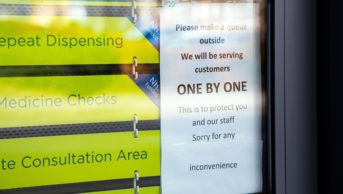
Charlie Milligan
The offices of the Company Chemists’ Association (CCA) are just a stone’s throw from the grand grade II listed headquarters of the Royal College of General Practitioners and the British Medical Association in London’s Bloomsbury. And even though the body represents around 6,000 high street pharmacies — roughly half the community pharmacy market in the UK — there are no stucco columns or brass name plates by its door to announce its importance. The CCA may be more than 120 years old (formed in 1898 as the Drug Companies Association), but its chief executive Malcolm Harrison works out of business-like premises, nestled among the restaurants near Euston Station.
Harrison joined Boots straight after qualifying as a pharmacist in 1997 and stayed with the company for 20 years. He climbed his way up to regional management before working in the multiple’s public affairs team, until he joined the CCA two years ago.
This wide experience must prove a valuable asset as he represents a sector facing threats to its existence. Funding cuts and competition from aggressively expanding internet pharmacies are big contributors to significant drops in profits and closures at branches of the UK’s largest pharmacy chains. At the same time, there are the ominous signs of a future shortage of pharmacists, which has led to some large employers pushing for a new route into the profession through five-year ‘degree apprenticeships’.
The Pharmaceutical Journal met Harrison to find out if he has the answers to help steer the sector through this minefield.
Does community pharmacy punch its weight in UK healthcare?
I don’t think pharmacy gets the recognition that it deserves. Community pharmacy does a great deal for the communities that it serves and indirectly, therefore, for the NHS.
What does community pharmacy need?
As with the general medical services (GMS) contract, longer-term funding would give the sector the confidence it needs to invest for the future. I don’t think anybody wants to see more of how things have gone in recent years: an erosion of real-term funding set against an increasing workload; the cost of delivering pharmacy to patients going up. I don’t think it’s a sustainable long-term solution.
We have to start looking at the opportunities that community pharmacy can bring in terms of provision of other clinical services for patients, based on the direction of the travel set out in the GMS contract and the ‘NHS Long Term Plan’, and look at population health, local networks of care, all the way up to integrated care systems. How do we knit into that in an integrated way — in a way that is valued by the system and that is beneficial to patients and the population at a local level?
How could this work specifically?
One area is referral schemes, such as the pharmacy connection schemes cited in the long-term plan, and the increased role of pharmacy in urgent care through the NHS urgent medicine supply advanced service and the digital minor illness referral service. One would hope that we could learn lessons from those and see them rolled out on a national scale, but we would want to see it done in a standardised way. The last thing we want is to try to do something quickly and not get it right. It’s really important that patients know what they can get from any pharmacy in the land.
And we could look at referral schemes from other parts of the sector, not just NHS 111. Once we have the infrastructure to enable referrals from within the system, that might open the door to more clinical roles in community pharmacy in the future.
Does the government understand that?
I’m not party to the community pharmacy contractual framework negotiations, but from what I can glean, NHS England and Keith Ridge, its chief pharmaceutical officer, are quite clear about how they see a bigger role for community pharmacy in urgent care and minor illness support for patients. I don’t think anyone hasn’t bought into that future at Department of Health and Social Care and pharmacy body level, but, as ever, the devil is in the detail.
We are going to see considerable pressure brought to bear because of workforce shortages in the next 18 months
You have warned about pharmacist shortages — what is the scale of the problem?
It’s a silent problem until it hits you. I think we are going to see considerable pressure brought to bear because of workforce shortages in the next 18 months, in terms of pharmacies being able to honour their NHS contracts and cover the shifts that need to be covered.
Over the past few years, we’ve seen a 25% drop in pharmacy school applications; more pharmacy schools are using clearing, and places are being left untaken.
The world has changed, including the way that people choose to work. People aren’t looking now for a job or a career for life, it is more a case of looking for a degree course that will give you options to do different things. Traditionally, once you qualified, more often than not you would stay on as a pharmacist. Now we have to look at how we make the profession more attractive so that people can work a portfolio career; maybe break down some of the barriers so that people can work in a hospital, a GP practice, a community pharmacy, a prison, in the military or on an oil rig.
But in the short term there are likely to be some difficulties. Even if we start targeting A-level students with an amazing recruitment campaign, they would not qualify until 2025, so we need to look at all options to ensure we continue to deliver safe and effective pharmaceutical care for the public in what could prove to be quite a challenging time.
And it’s not just community pharmacy. Through conversations that I’ve been having, it’s clear that there has been a real draw in the hospital sector into new roles for pharmacists, and it’s how we make sure that existing roles are being filled.
Would pharmacist apprenticeships help?
We were not involved in the apprenticeship proposals, but I know some of our members were. It’s an interesting area that needs to be explored. Any responsible organisation would want to explore all opportunities to make sure we have the professional resource we need to meet the demands of patients, the public and the NHS.
Our members have to pay into the apprenticeship levy and it is well documented how difficult it is for businesses to access that levy to train people up. They are looking for ways they can utilise this fund, which was set aside by the government to improve access to quality training for young people, and this is a good thing. You can, in principle, see the logic behind it.
I can see advantages of pharmacist apprenticeships, but we have to make sure it is the right thing for the profession, the sector, employers and students
Any training for pharmacists will have to be signed off by the regulator. There are no shortcuts there and I don’t think there should be but, if it means coming out of university with a guaranteed job and less debt, I could see why students would go for it. I can see advantages, but we have to make sure it is the right thing for the profession, the sector, employers and students.
Is there likely to be a trend in store closures by the large multiples?
The entire sector is under an awful lot of pressure for many reasons, which are also well documented. Store closures are not unique to our members, but the way their businesses are structured means their decisions are more in the public domain than with private contractors. I can’t comment on current or future closures but there is a real challenge out there. The government decided several years ago to open up access to the pharmacy market, which saw an increase in the number of pharmacies in England. There wasn’t a corresponding change in Wales and Scotland and we are not seeing the kind of financial pressures in those countries that we are in England.
In the past month, two of our members have launched apps that allow customers to collect their prescriptions
Are big pharmacy chains falling behind online-only pharmacies?
I don’t see online pharmacies as a threat — to call them that is to have your head in the sand. There is a move to online pharmacy and this should be embraced by the sector. Is there a perception that some are behind others? Probably, because they have to do things their way and tend not to talk publicly about what they are doing. But in the past month, two of our members have launched apps that allow customers to collect their prescriptions.
If a pharmacist spends more of their time providing face-to-face clinical care for patients and they are less chained to the operational function of supply, then that can only be a good thing. Wouldn’t it be a great position to be in where a community pharmacist is there 100% of the time providing clinical services to patients while supervising the supply of medicines, which are either assembled onsite or offsite, through that building? I think that would be great, particularly if we are looking to attract young people into the profession who walk into a pharmacy and see the pharmacist practising and counselling and providing care to patients. That has got to be an attractive future for someone.
Why is the gender pay gap so wide for some big pharmacy chains?
I know all of our member companies are working hard to ensure they have equality of pay, but there is more we can do. I know it is something that all modern responsible employers want; to make sure they ensure equality across gender and other differences in the workplace. Our board has 12 members, 6 of whom are women, and it has been that way for several years. So we definitely promote women into senior positions. Out of all the pharmacy organisations, our board is probably more representative than others.


